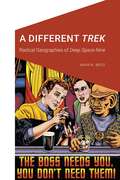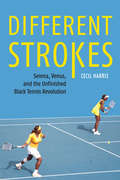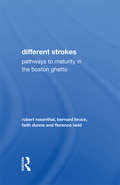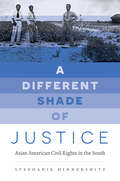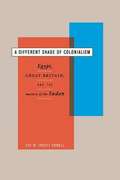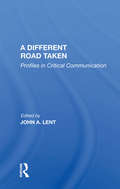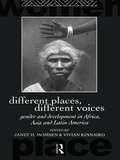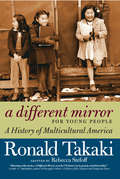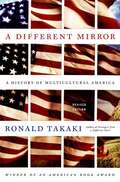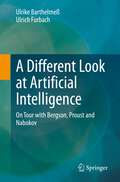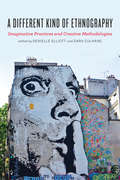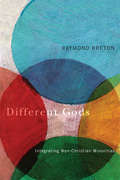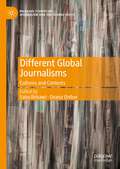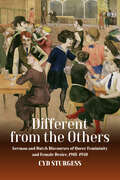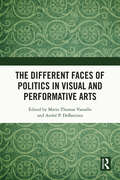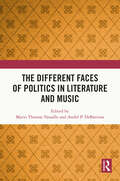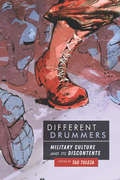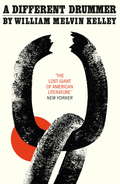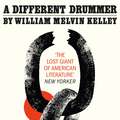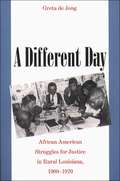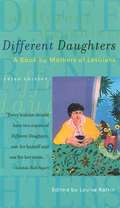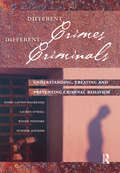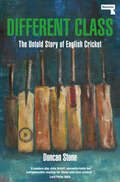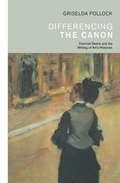- Table View
- List View
A Different Trek: Radical Geographies of Deep Space Nine (Cultural Geographies + Rewriting the Earth)
by David K. SeitzA different kind of Star Trek television series debuted in 1993. Deep Space Nine was set not on a starship but a space station near a postcolonial planet still reeling from a genocidal occupation. The crew was led by a reluctant Black American commander and an extraterrestrial first officer who had until recently been an anticolonial revolutionary. DS9 extended Star Trek&’s tradition of critical social commentary but did so by transgressing many of Star Trek&’s previous taboos, including religion, money, eugenics, and interpersonal conflict. DS9 imagined a twenty-fourth century that was less a glitzy utopia than a critical mirror of contemporary U.S. racism, capitalism, imperialism, and heteropatriarchy. Thirty years after its premiere, DS9 is beloved by critics and fans but remains marginalized in scholarly studies of science fiction. Drawing on cultural geography, Black studies, and feminist and queer studies, A Different &“Trek&” is the first scholarly monograph dedicated to a critical interpretation of DS9&’s allegorical world-building. If DS9 has been vindicated aesthetically, this book argues that its prophetic, place-based critiques of 1990s U.S. politics, which deepened the foundations of many of our current crises, have been vindicated politically, to a degree most scholars and even many fans have yet to fully appreciate.
Different Strokes: Serena, Venus, and the Unfinished Black Tennis Revolution
by Cecil HarrisThe days of tennis as a country club sport for the aristocracy have long passed, as have the pre–Open era days when black players faced long odds just to be invited to the four Grand Slam events. An entire generation of sports fans has grown up seeing Venus and Serena Williams as the gold standard in American professional tennis. Although the Williams sisters have done more than any other players to make tennis accessible to a diverse population, it&’s not as if the tennis revolution is over. When you watch tennis next, take a close look at the umpire, the person sitting in the high chair of authority at courtside. Look at the tournament referee and the tournament director, the officials who run the tournament. In those seats of power and influence, blacks are still woefully underrepresented.Different Strokes chronicles the rise of the Williams sisters, as well as other champions of color, closely examining how African Americans are collectively faring in tennis, on the court and off. Despite the success of the Williams sisters and the election of former pro player Katrina Adams as the U.S. Tennis Association&’s first black president, top black players still receive racist messages via social media and sometimes in public. The reality is that while significant progress has been made in the sport, much work remains before anything resembling equality is achieved.
Different Strokes: Pathways to Maturity in the Boston Ghetto
by Robert RosenthalThis book describes the Pathways project that traces the individual development of several black young men from poor families who grew up in the Roxbury/North Dorchester ghetto from 1967 to 1974. It is about aspects of self-perception and identity, and resources and pathways to reach goals.
A Different Shade of Justice: Asian American Civil Rights in the South (Justice, Power, and Politics)
by Stephanie HinnershitzIn the Jim Crow South, Chinese, Filipino, Japanese, and, later, Vietnamese and Indian Americans faced obstacles similar to those experienced by African Americans in their fight for civil and human rights. Although they were not black, Asian Americans generally were not considered white and thus were subject to school segregation, antimiscegenation laws, and discriminatory business practices. As Asian Americans attempted to establish themselves in the South, they found that institutionalized racism thwarted their efforts time and again. However, this book tells the story of their resistance and documents how Asian American political actors and civil rights activists challenged existing definitions of rights and justice in the South.From the formation of Chinese and Japanese communities in the early twentieth century through Indian hotel owners' battles against business discrimination in the 1980s and '90s, Stephanie Hinnershitz shows how Asian Americans organized carefully constructed legal battles that often traveled to the state and federal supreme courts. Drawing from legislative and legal records as well as oral histories, memoirs, and newspapers, Hinnershitz describes a movement that ran alongside and at times intersected with the African American fight for justice, and she restores Asian Americans to the fraught legacy of civil rights in the South.
A Different Shade of Colonialism: Egypt, Great Britain, and the Mastery of the Sudan
by Eve M. Troutt PowellEve M. Troutt Powell challenges many accepted tenets of the binary relationship between European empires and non-European colonies by examining the triangle of colonialism marked by Great Britain, Egypt, and the Sudan.
A Different Road Taken: Profiles In Critical Communication
by John A LentDallas Smythe, George Gerbner, Herbert Schiller, James Halloran, Kaarle Nordenstreng- these five seminal figures form the backbone of current scholarship in critical communication. From policy research to television demographics and from economic globalization to cultural imperialism, their insights and discoveries have given both scholars and the
Different Places, Different Voices: Gender and Development in Africa, Asia and Latin America (Routledge International Studies of Women and Place)
by Janet H. Momsen Vivian KinnairdDifferent Places, Different Voices challenges Western feminist and post-colonial approaches in its analysis of the changing lives of women of Asia, Africa, Latin America and Oceania. Recognising the significance of place, this is a book informed by the voices of female geographers from the developing world. Twenty case studies present regional perspectives on urban and rural development, household reproduction and production and community organisation. The theoretical and contextual approach and the emphasis on location and positionality highlight the differences created by place to suggest other ways of seeing.
A Different Mirror for Young People: A History of Multicultural America (For Young People Series)
by Rebecca Stefoff Ronald TakakiA longtime professor of Ethnic Studies at the University of California at Berkeley, Ronald Takaki was recognized as one of the foremost scholars of American ethnic history and diversity. When the first edition of A Different Mirror was published in 1993, Publishers Weekly called it "a brilliant revisionist history of America that is likely to become a classic of multicultural studies" and named it one of the ten best books of the year. Now Rebecca Stefoff, who adapted Howard Zinn's best-selling A People's History of the United States for younger readers, turns the updated 2008 edition of Takaki's multicultural masterwork into A Different Mirror for Young People. Drawing on Takaki's vast array of primary sources, and staying true to his own words whenever possible, A Different Mirror for Young People brings ethnic history alive through the words of people, including teenagers, who recorded their experiences in letters, diaries, and poems. Like Zinn's A People's History, Takaki's A Different Mirror offers a rich and rewarding "people's view" perspective on the American story.
A Different Mirror: A History of Multicultural America
by Ronald TakakiTakaki (emeritus, ethnic studies, U. of California-Berkeley) takes the perspective of ethnic, racial, and national minorities to recount the history of the US since the founding of the first English colony in 1607. The first edition won an American Book Award in 1993. This second incorporates new passages on Franklin Roosevelt's response to the Holocaust, the influx of Southeast Asian immigrants after the Vietnam War, and people pushed northward by poverty in Mexico.
A Different Look at Artificial Intelligence: On Tour with Bergson, Proust and Nabokov
by Ulrike Barthelmeß Ulrich FurbachDigitalization is inexorably conquering our lives - also with artificial intelligence (AI) methods. Search engine operators, social network operators and shipping platform operators know more and more about us, about our buying and living habits. User data has become a valuable commodity. We live and work with computer systems that behave intelligently or are even intelligent. Questions like "Can machines be intelligent?" or "Can they have emotions or a consciousness?" keep popping up. To enable readers to form their own opinion on these questions, the authors clearly explain individual techniques or methods of AI and relate them to approaches from philosophy, art and neurobiology. Topics such as logical reasoning, knowledge and memory play just as important a role as machine learning and artificial neural networks. In the foreground is the question of what constitutes memory and thinking, what role our emotions play when we as humans move through life, through the world. A book that offers unusual perspectives on artificial intelligence.
A Different Kind of Ethnography: Imaginative Practices And Creative Methodologies
by Dara Culhane Denielle ElliottBuilding on the sensory ethnographic trend in contemporary sociocultural anthropology, this collection introduces the idea of a different kind of ethnography: an imaginative and creative approach to anthropological inquiry that is collaborative, open-ended, embodied, affective, and experimental. The authors treat ethnography as a methodology that includes the whole process of ethnography, from being fully present while engaging with the experience to analyzing representing, and communicating the results, with the hope of capturing different kinds of knowledge and experiences The book is structured around various methodologies–sensing, walking, writing, performing, and recording—and includes innovative exercises that allow both seasoned and aspiring ethnographers to develop a practice that can deepen and extend ethnographic inquiry.
Different Gods: Integrating Non-Christian Minorities into a Primarily Christian Society
by Raymond BretonIn recent decades the ebb and flow of immigration to Canada has changed significantly, with the majority of immigrants coming from non-European countries. A striking feature of this shift is that a significant proportion of immigrants are non-Christians newly immersed in a society entrenched in Christian ideals. In Different Gods, Raymond Breton looks at the significance of religious differences and what they mean for immigrants, non-immigrants, and Canada's future. Breton examines the evolution over time of the religious attitudes and behaviour of the new minorities and the challenges that their presence poses to the receiving society. The analysis consists of a review of recent research and formulates possible conclusions about the transformations that integration may bring about for both the minorities and the receiving society. An important analysis of immigration in an era of rapidly changing social values, Different Gods looks boldly into issues of collective identity and cultural accommodation.
Different Global Journalisms: Cultures and Contexts (Palgrave Studies in Journalism and the Global South)
by Saba Bebawi Oxana OnilovThis edited collection seeks to better understand how journalism across cultures differs, presenting an in-depth exploration of global practices that departs from the typical Western-centric approach. Journalists across the world are trained, generally speaking, within Western models of reporting and are taught to do so as a practice where reporters need to aspire and aim for. Yet what such training is short of achieving is teaching reporters how to 'do' journalism within their own environments. In turn, what is required is a method of journalistic training and practice that is reflective of the actual practice reporters encounter on the ground. In order to do so, a better understanding of how journalism is practised in different parts of the world, the context surrounding such practices, the issues and challenges associated, and the positive practices that Western journalism can offer, is necessary. Promoting and deploying a culturally-specific and politically-relevant journalism, this book provides just that.
Different from the Others: German and Dutch Discourses of Queer Femininity and Female Desire, 1918–1940
by Cyd SturgessFor much of Europe, the interwar period was one of cultural expansion and diversion and increased visibility for lesbians. While historical research on Germany during the period immediately after the First World War has been extensively studied by historians through the lens of gender and sexuality—with an implicit emphasis on the “masculine” dimension of queer female sexuality—the Dutch context has been virtually ignored. Through careful and sensitive studies of medico‐social discourses, media representations, and literary depictions of queer femininity, Different from the Others recovers the submerged history of queer feminine women in both Germany and the Netherlands. Cyd Sturgess provides a theoretical analysis that makes key empirical contributions to the history of Dutch gays and lesbians while reframing our collective understanding of queer femininity more broadly.
The Different Faces of Politics in the Visual and Performative Arts
by Mario Thomas Vassallo André P. DeBattistaThis book highlights the linkages between politics and governance and the arts. The essays in the volume show how visual and performative arts have challenged those in power — or conversely patronised by them — been used for propaganda, stir up national fervour and found themselves at the receiving end of political censure. They focus on the tension and symbiosis between the politician and the artist foregrounding how they have always tried to influence, challenge, and, in some cases, undermine one another. This volume will serve as an indispensable source for researchers and academics in political science, the humanities and performing arts.
The Different Faces of Politics in Literature and Music
by Mario Thomas Vassallo André P. DeBattistaThis book highlights the links between politics and governance and the arts. The essays in the volume show how literature and music have challenged those in power risking political censure. In addition, they also try to delineate how patronage has been used for propaganda, or to stir up national fervour. They focus on the tension and symbiosis between the politician and the artist foregrounding how they have always tried to influence, challenge, and, in some cases, undermine one another. This volume will serve as an indispensable source for researchers and academics in political science, the humanities and performing arts.
Different Drummers: Military Culture and Its Discontents
by Tad TulejaDifferent Drummers explores the disjunction between organizational solidarity and individual pushback in military organizations, examining how members of the armed forces express ambivalent attitudes about their service. The volume focuses not on antimilitary sentiment but on psychological complexity within a loyal opposition, considering examples of creative insubordination and analyzing the “oppositional positioning” of individuals whose military identity is conflicted. This multidisciplinary collection brings in the perspectives of scholars from folklore, literary studies, psychology, and media studies, as well as the first-person perspectives of veterans. It includes chapters on the vernacular genres of bodylore, folksong, personal narrative, and legend; literary items like soldiers’ memoirs and poetry; the artwork of soldier cartoonists; and accounts of defying the chain of command in the field. Ideally, the goal of military basic training is to replace recruits’ focus on their own individuality with an unquestioned devotion to group solidarity. In reality, unit cohesion is constantly challenged by humans clinging obstinately to their non-collective personalities. Different Drummers focuses on those in uniform who feel themselves to be both of the military culture and at odds with it. It shows how these loyal “discontents” find ways of communicating and interacting with others that sometimes defy institutional expectations. Contributors: Ron Ben-Tovim, Carol Burke, Richard Allen Burns, Catherine Calloway, James I. Deutsch, Ronald Fry, Angus Kress Gillespie, Christina M. Knopf, Jay Mechling, Matthew David Perry, Mark C. Russell, John Paul Wallis
A Different Drummer: the extraordinary rediscovered classic
by William Melvin Kelley'More than lives up to the hype' Observer'Set to become a publishing sensation' Kirsty Lang, BBC Front Row'An astounding achievement' Sunday Times'The lost giant of American literature' New YorkerJune, 1957. One afternoon, in the backwater town of Sutton, a young black farmer by the name of Tucker Caliban matter-of-factly throws salt on his field, shoots his horse and livestock, sets fire to his house and departs the southern state. And thereafter, the entire African-American population leave with him.The reaction that follows is told across a dozen chapters, each from the perspective of a different white townsperson. These are boys, girls, men and women; either liberal or conservative, bigoted or sympathetic - yet all of whom are grappling with this spontaneous, collective rejection of subordination.In 1962, aged just 24, William Melvin Kelley's debut novel A Different Drummer earned him critical comparisons to James Baldwin and William Faulkner. Fifty-five years later, author and journalist Kathryn Schulz happened upon the novel serendipitously and was inspired to write the New Yorker article 'The Lost Giant of American Literature', included as a foreword to this edition.
A Different Drummer: the extraordinary rediscovered classic
by William Melvin KelleyIn 1962, aged just 24, William Melvin Kelley's debut novel A Different Drummer earned him critical comparisons to James Baldwin and William Faulkner. Fifty-five years later, author and journalist Kathryn Schulz happened upon the novel serendipitously and was inspired to write the New Yorker article 'The Lost Giant of American Literature', included as a foreword to this edition.June, 1957. One afternoon, in the backwater town of Sutton, a young black farmer by the name of Tucker Caliban matter-of-factly throws salt on his field, shoots his horse and livestock, sets fire to his house and departs the southern state. And thereafter, the entire African-American population leave with him.The reaction that follows is told across a dozen chapters, each from the perspective of a different white townsperson. These are boys, girls, men and women; either liberal or conservative, bigoted or sympathetic - yet all of whom are grappling with this spontaneous, collective rejection of subordination.A lost masterpiece republished for 2018, A Different Drummer is for readers who have been waiting for the next rediscovered classic.(P)2018 Quercus Editions Limited
A Different Day
by Greta De JongExamining African Americans' struggles for freedom and justice in rural Louisiana during the Jim Crow and civil rights eras, Greta de Jong illuminates the connections between the informal strategies of resistance that black people pursued in the early twentieth century and the mass protests that emerged in the 1950s and 1960s. Using evidence drawn from oral histories and a wide range of other sources, she demonstrates that rural African Americans were politically aware and active long before civil rights organizers arrived in the region in the 1960s to encourage voter registration and demonstrations against segregation. De Jong explores the numerous, often-subtle methods African Americans used to resist oppression within the confines of the Jim Crow system. Such everyday forms of resistance included developing strategies for educating black children, creating strong community institutions, and fighting back against white violence. In the wake of the economic changes that swept the South during and after World War II, these activities became more open and organized, culminating in voter registration drives and other protests conducted in cooperation with civil rights workers. Deeply researched and accessibly written, A Different Day spotlights the ordinary heroes of the freedom struggle and offers a new perspective on black activism throughout the twentieth century.
Different Daughters: A Book by Mothers of Lesbians
by Louise Rafkin"This book will help your mom understand. Give it to her."--Betty DeGeneres Coming out to mom is a lesbian rite of passage. In Different Daughters, thirty mothers of lesbians come together to trace their journeys towards acceptance of their daughters. Facing their fears and confusion, prejudice and misunderstandings, they speak honesty and bravely about the difficulties and joys of life with their "different daughters." Writing about families, community, religion, grandchildren, bisexuality, transgender issues, and coming out, the authors of Different Daughters raise questions shared by all mothers: How can we accept our children for who they are? How can we love our children even when they are different from us? This updated and expanded third edition of Louise Rafkin's landmark anthology includes new stories by mothers of bisexual women and young lesbians, a sister of a lesbian, and the brave testimony of one mother whose lesbian daughter is in the process of redefining her gender.
Different Daughters
by Louise Rafkin"This book will help your mom understand. Give it to her."-Betty DeGeneres<P> Coming out to mom is a lesbian rite of passage. In Different Daughters, thirty mothers of lesbians come together to trace their journeys towards acceptance of their daughters. Facing their fears and confusion, prejudice and misunderstandings, they speak honesty and bravely about the difficulties and joys of life with their "different daughters."Writing about families, community, religion, grandchildren, bisexuality, transgender issues, and coming out, the authors of Different Daughters raise questions shared by all mothers: How can we accept our children for who they are? How can we love our children even when they are different from us?This updated and expanded third edition of Louise Rafkin's landmark anthology includes new stories by mothers of bisexual women and young lesbians, a sister of a lesbian, and the brave testimony of one mother whose lesbian daughter is in the process of redefining her gender.
Different Crimes, Different Criminals: Understanding, Treating and Preventing Criminal Behavior
by Wendy Povitsky Doris Layton Mackenzie Lauren O'Neill Summer AcevedoThis book focuses on the importance of incorporating both sociological and psychological viewpoints in the understanding of criminal behavior. It identifies and explains emerging criminal offenders within the criminal justice system, examining the individual differences that make different types of offenders unique.
Different Class: The Untold Story of English Cricket
by Duncan StoneIn telling the story of cricket from the bottom up, Different Class demonstrates how the "quintessentially English" game has done more to divide, rather than unite, the English.In 1963, the West Indian Marxist C.L.R. James posed the deceptively benign question: "What do they know of cricket, who only cricket know?"A challenge to the public to re-consider cricket and its meaning by placing the game in its true social, political and economic context, James was, all too subtly, attempting to counter the game&’s orthodox history that, he argued, had played a key role in the formation of national culture. As a consequence, he failed, and the history of cricket in England has retained the same stresses and lineaments as it did a century ago — until now.In examining recreational rather than professional (first-class) cricket, Different Class does not simply challenge the widely accepted orthodoxy of English cricket, it demonstrates how the values and belief systems at its heart were, under the guise of amateurism, intentionally developed in order to divide the English along class lines at every level of the game. If the creation of opposing class-based cricket cultures in the North and South of England grew out of this process, the institutional structures developed by those in charge of English cricket continue to discriminate. But, as much as the exclusion of Black and South Asian cricketers from the recreational mainstream is the most obvious example, it is social class that remains the greatest barrier to participation in what used to be the national game.
Differencing the Canon: Feminism and the Writing of Art's Histories (Re Visions Ser.)
by Griselda PollockIn this major book, Griselda Pollock engages boldly in the culture wars over `what is the canon?` and `what difference can feminism make?` Do we simply reject the all-male line-up and satisfy our need for ideal egos with an all women litany of artistic heroines? Or is the question a chance to resist the phallocentric binary and allow the ambiguities and complexities of desire - subjectivity and sexuality - to shape the readings of art that constantly displace the present gender demarcations?
